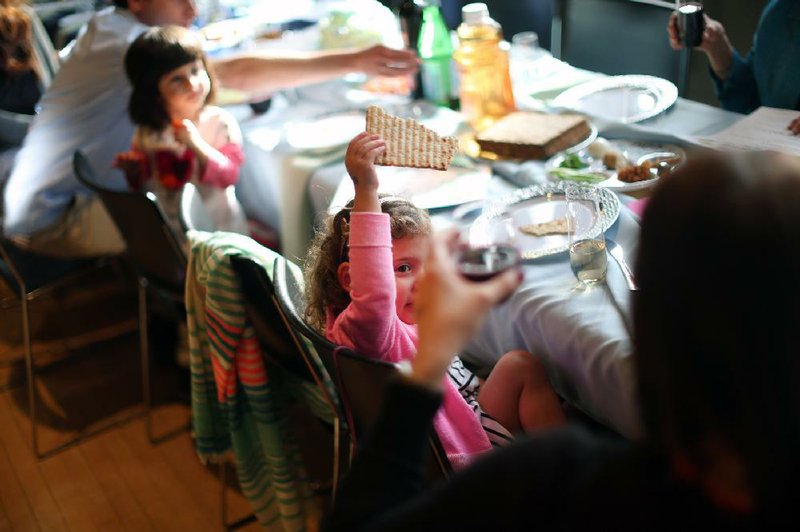Over the next several weeks, Americans will conduct virtual Seders, cook Easter brunch for just one or two and break their Ramadan fasts while isolating at home.
All of these holy days and celebrations, which promote renewal and reflection, involve gathering around meals. Social distancing has suddenly posed a big barrier, and some festivities have been called off.
Yet despite widespread restrictions on travel, congregating in large groups or attending religious services, many people are finding creative ways to stage their holidays. Food, one of a few pleasures still available in the lockdown, has taken on even more importance.
Doug Kahn, a Reform rabbi in San Francisco, sent an invitation this month via Zoom, the virtual conferencing service, asking 20 guests to join him and his wife, Ellen, for a virtual Seder dinner on Wednesday, the eve of Passover. Rabbi Kahn, 69, scanned the Haggadah, the text that guides Jews through the rituals of the Seder, into a PDF file and told everyone to email their favorite recipes for the group to share.
[CORONAVIRUS: Click here for our complete coverage » arkansasonline.com/coronavirus]
The hardest element of the Seder to do online, he said, is the afikoman, the piece of matzo that is usually hidden in the house for children to hunt for. The rabbi plans to take his laptop computer from room to room and let people guess where they think the matzo is hidden.
To stock up early for Easter Sunday, April 12, Marley Giggey, a graduate student in Cincinnati, has been sending her husband, Phill, who works the night shift at Target, to the supermarket on his way home, just as the store opens. She is paring down her celebration to her family of four, from the usual 20 or so.
Still, she'll need plenty of eggs, both to cook with and to dye, and a ham. (Both have been in short supply at the grocery.) Giggey, 32, and several family members bought Facebook Portals so they can make candy together, an Easter tradition since Giggey was a girl, and one she hopes to pass down to two young children.
Hassan Chami, a pharmacy owner, runs a Ramadan food festival in Dearborn Heights, Mich., that in past years brought in nearly 10,000 guests and more than 40 vendors. This year's was supposed to take place every Friday and Saturday night from May 10-23, going until 3 a.m. so the area's sizable Muslim population could break the daily fast together with the predawn meal known as suhoor. (Ramadan in the United States runs from April 23 to May 23 this year.)
Chami canceled the event and is donating some of the sponsorship money he received toward buying supplies for local hospitals. He also owns a restaurant, the Terry Melt, which, along with other festival vendors, is giving away food to hospital workers. Chami, 31, said he was sad about canceling the festival but felt that his relief effort was in the spirit of the occasion.
"Ramadan is a month where you deprive yourself physically to allow yourself to feel how others are feeling in times of need," he said.
Many Christians and Jews are also scaling back their plans for Easter and Passover.
Ann Ittoop, a food blogger whose family is from Kerala, India, will likely stay home with her husband and mother-in-law in East Hanover, N.J., baking pesaha appam, an unleavened bread made of rice that Kerala Christians eat on Holy Thursday, rather than visit her parents in Charlotte, N.C. To stick with custom, on Easter Sunday, Ittoop, 32, plans to make her mother's chicken curry and biryani, but she knows how to make them only in big batches.
"I guess we will be feasting for a few days," she said.
In Bethesda, Md., Kathy Sklar, a business program manager at the Smithsonian Institution, will host her Seder via Zoom, and is packing up portions of brisket, gefilte fish and matzo ball soup to drop off at guests' homes so they can all share the same meal.
"We even had extra leaves made for our dining room table so we could all finally sit together," Sklar, 62, said with a sigh. "That will have to wait another year."
For some, being confined to the home is an opportunity. Charlotte Niedermann, 30, a fundraiser in Cambridge, Mass., sees Passover this year as a chance to try new dishes, as her boyfriend's parents, whom she usually visits during Passover, are "not adventurous eaters."
Meghan Groob, 32, a speechwriter in Seattle, said that with all the time she is spending at home, she can finally cook kosher meals she is excited about. Normally, she has to go to the office and can't do meal prep. "By the end of Passover I am just eating potato chips and raw fruit," she said.
This Easter, Tyrone Henderson, 27, had planned to drive to Fredericksburg, Va., to see his sister. But he was recently laid off as chef de partie at Kith and Kin, in Washington. He is planning to cook for his grandmother, whom he lives with but previously didn't see often because of his busy restaurant schedule.
"When I am at work, usually she just goes to McDonald's and gets chicken nuggets and a milkshake," he said. "It'll be nice to cook her a full meal. People should be able to have a nice meal for Easter, no matter what place we are in as a nation."
All of the constraints can feel unsettling, but Helen Bahena, a college student in Houston, pointed out that they resonate with the spiritual underpinnings of the holidays.
She is used to an elaborate Easter brunch with her large Roman Catholic family, but this year she'll be cooking with pantry staples like beans and rice.
"Jesus fed a whole crowd with just some bread and fish," she said. "We'll be OK."
Religion on 04/04/2020

